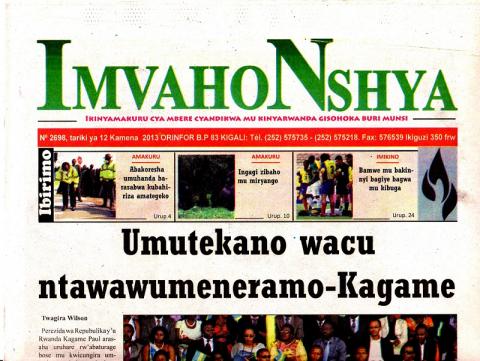CAMP (Cooperative Africana Materials Project) recently microfilmed issues of the Rwandan newspaper Imvaho Nshya from 2001-2013. These 22 reels of newly microfilmed issues complement CAMP’s earlier holdings of this title and its predecessor, Imvaho. The newly microfilmed issues of Imvaho Nshya cover most of the Presidency of Paul Kagame, who assumed that office in March 2000.
Imvaho Nshya is published in the Kinyarwanda language by the government agency ORINFOR (Office rwandais d'information). Imvaho Nshya was established by the government in early 1960 as a bi-monthly newspaper under the title Imvaho, which means "original/authentic information" and is currently the second longest running newspapers in Rwanda. The name change from Imvaho to Imvaho Nshya "The new original/authentic information" took place after the 1994 Rwandan genocide.
Since inception, this newspaper was published by the Ministry of Information until 1974 when the mandate to publish it was transferred to Office Rwandaise d’Information (ORINFOR) which was a government owned agency. In addition to publishing Imvaho, ORINFOR also ran Radio Rwanda, TV Rwanda, and also published a French language newspaper La Nouvelle Releve.
By 2007, Imvaho Nshya had a circulation of 51,000.
CAMP Holdings for this title now include:
- Imvaho Nshya (Aug. 2001 – Oct. 2013)
- Imvaho Nshya (Oct. 1994-Apr. 1995)
- Imvaho (Nov. 1984 - Feb. 1994)
- Imvaho (Jan. 1977 – Dec. 1988)


